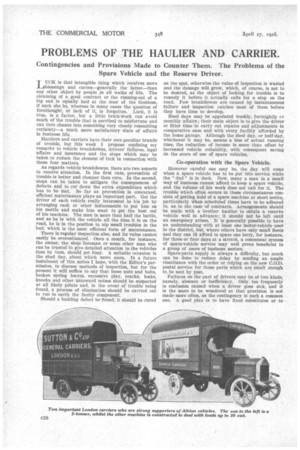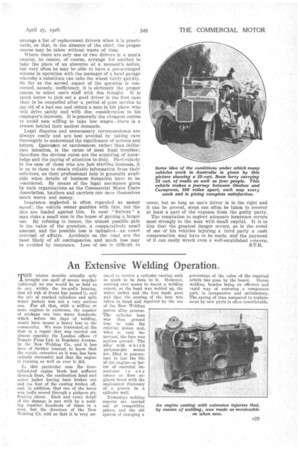PROBLEMS OF THE HAULIER AND CARRIER.
Page 12

Page 13

If you've noticed an error in this article please click here to report it so we can fix it.
Contingencies and Provisions Made to Counter Them. The Problems of the Spare Vehicle and the Reserve Driver.
TUCK is that intangible thing which receives more 4 blessings and curses—generally the latter—than any other object by people in all walks of life. The obtaining of a good contract or the running-out of a big end is equally laid at the door of the Goddess, if such she be, whereas in many eases the question of forethought, or lack of it, is forgotten. Luck, it is true, is a factor, but a little brain-work can avoid much of the trouble that is ascribed to misfortune and can turn chance into something very closely resembling certainty—a much more satisfactory State of affairs in business life.
Hauliers and carriers have their own peculiar brands of trouble, but this week I propose confining my remarks to vehicle breakdowns, drivers' failures, legal affairs and insurance and the steps which may be taken to reduce the element of luck in connection with these four matters.
As regards vehicle breakdowns, there are two aspects to receive attention. In the first case, prevention of trouble is better and cheaper than cure. In the second, -steps can be taken to mitigate the consequences of defects and to cut down the extra expenditure which has to be met. So far as prevention is concerned, efficient maintenance plays an important part. Get the driver of each vehicle really interested in his job by arranging cash or other inducements to put him on his mettle and make him want to get the best out of his machine. The man is more than half the battle, and as he is with the vehicle all the time it is on the road, he is in the position to nip small troubles in the bud, which is the most efficient form of maintenance.
There is regular inspection also, and its value cannot easily be overestimated. Once a month, for instance, the owner, the shop foreman or some other man who can be trusted to give detailed attention to the vehicles item by item, should get busy. A suitable occasion is the shed day, about which more anon. In a future instalment of this series I hope, with the Editor's permission, to discuss methods of inspection, but for the present it will suffice to say that loose nuts and bolts, broken spring leaves, excessive play, cracks, leaks, knocks and other untoward noises should be suspected at all likely points and, in the eventof trouble being found, a process of elimination should be carried out to run to earth the faulty component.
Should a budding defect be found, it should be Cured on the spot, otherwise the value of Inspection is wasted and the damage will grow, which, of course, is not to be desired, as the object of looking for trouble is to remedy it before it actually calls for a stop on the road. Few breakdowns are caused by instantaneous failure and inspection catches most of them before they have time to develop.
Shed days may be appointed weekly, fortnightly rr monthly affairs; their main object is to give the driver or fitter time to carry out repairs and adjustments in comparative ease and with every facility afforded by the home garage. Although the shed day, or half-day, whichever it may be, means a loss of actual running time, the reduction of income is more than offset by increased vehicle reliability, with consequent saving on the score of use of spare vehicles.
Co-operation with the Spare Vehicle.
However careful one may be, the day will come when a spare vehicle has to be put into service while the " dud " is in dock. Now, many a man in a small way of business cannot afford to keep a spare vehicle, and the volume of his work does not call for it. The trouble which often occurs in these circumstances consists of getting hold of a spare machine at short notice, particularly when scheduled times have to be adhered to, as in the case of contracts. Arrangements should be made with a brother haulier to obtain a reserve vehicle well in advance; it should not be left until an emergency arises. It is generally possible to have an understanding with at least one motor-vehicle user in the district, but, where others have only small fleets and they can ill afford to spare one lorry, for instance, for three or four days at a stretch, a communal system of spare-vehicle service may well prove beneficial to a group of users of business motors.
Spare-parts supply is always a difficulty, but much cpn be done to reduce delay by sending au ample remittance with the order or relying on the new C.O.D. postal service for those parts which are small enough to be sent by post.
Failures on the part of drivers may be of two kinds, namely, absence or inefficiency. Only too frequently is confusion caused when a driver goes sick, and it is the more to be wondered at that provision is not made-more often, as the contingency is such a common one. A good plan is to have fixed substitutes or to
arrange a list of replacement drivers when it is practicable, so that, in the absence of the chief, the proper course may be taken without waste of time.
Where-there are only one or two drivers in a man's employ, he cannot, of course, arrange for another to take the place of an absentee at a moment's notice, but very often he may be able to have a pre-arranged scheme in operation with the manager of a local garage whereby a substitute can take the wheel fairly quickly. So far as the second aspect of the question is concerned, namely, inefficiency, it is obviously the proper course to select one's staff with due thought. It is much better to pick out a good driver in the first case than to be compelled after a period of poor service to get rid of a bad one and obtain a man in his place who will drive safely and with due consideration to his employer's interests. It is generally the cheapest course to avoid men willing to take low wages—there is a reason behind their modest demands.
Legal disputes and unnecessary correspondence are always costly and are best avoided by taking care thoroughly to understand the significance of actions and letters. Ignorance or carelessness, rather than deliberate intention, is the cause of most legal troubles; therefore the obvious cures are the acquiring of knowledge and the paying of attention to duty. Particularly In the case of those who are just starting business, it is up to them to obtain reliable information from their solicitors, as their professional help is generally available when details of business formation have to be considered. By means of the legal assistance given by such organizations as the Commercial Motor Users Association, hauliers and carriers can save themselves much worry and money.
Insurance neglected is often regarded as money saved ; the vehicle owner gambles with fate, but the dice are loaded against him. In most "flutters" man risks a small sum in the hops of gaining a larger one. By refusing to insure, the utmost possible gain is the value of the premium, a comparatively small amount, and the possible loss is unlimited—an exact reversal of affairs. .gccidents on the road are the most likely of all contingencies, and much loss may be avoided by insurance. Loss of use is difficult to
cover, but so long as one's driver is in the right and it can be proved, steps can often be taken to recover at least a part of the expense from the guilty party.
The temptation to neglect adequate insurance occurs most strongly to the man with small capital. It Is to him that the greatest danger occurs, as in the event of one of his vehicles injuring a third party a cash compensation may have to be made, and the payment of it can easily wreck even a well-established concern.
S.T.R.
































